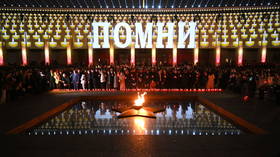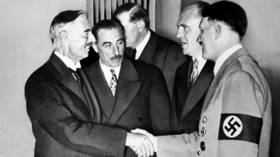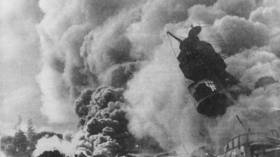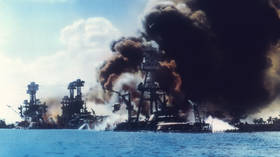The US and Russia mark Pearl Harbor and Hitler's invasion very differently – that tells us a lot about national identity
Over generations, perceptions distort history, and keeping memory alive is important for national identity

Last month, Russia marked June 22, the date Operation Barbarossa - or Hitler’s invasion of the Soviet Union – began in 1941. As a former American officer from a military family, whose close ancestors fought in World War II, I could not but reflect on why in America the date that war began for us – December 7, when the Japanese attacked Pearl Harbor – is not observed as solemnly as June 22 is in Russia.
My father was a career Air Force officer which meant that, when I was a child, we moved from place to place, depending on the needs of the service. In the early 1970’s, we were fortunate to be stationed at Hickam Air Force Base, on the island of Oahu in the state of Hawaii. My father was assigned to the headquarters of the US Pacific Air Force. The building he worked in bore the bullet holes made when Japanese aircraft strafed it during the attack. These scars of war, together with similar holes in the wooden banister of the interior staircase, were retained as part of an official policy designed to instill the mantra, “Never Again” in everyone who saw them.
The other constant reminder of Japanese perfidy existed across Pearl Harbor Bay, off Ford Island, where on December 7, 1941, the US Pacific Fleet was moored. There, one could find the rusting hulls of the USS Arizona and USS Utah, left where they sank, a permanent cemetery for the thousands of sailors who lost their lives in the Japanese surprise attack. Over the remains of the USS Arizona a white structure had been built, a memorial to those lost that day. One could reach it by ferry. I visited it often, and always found myself staring at the holes in the ship’s structure where the massive turrets containing the Arizona’s mighty 14-inch guns had been mounted. I took solace in the thought that one of these turrets had been recovered and re-mounted on the USS Nevada and was used to bombard Japanese positions during the battles for Iwo Jima and Okinawa; even as a child, one can learn to hate, especially when gazing upon the graves of so many.
My grandmother on my father’s side came to visit us while we were in Hawaii. Her husband, Irving Ritter, had served in the US Air Corps during the first World War, flying Curtiss ‘Jenny’ fighters (the war ended before he could be sent to the front). Irving and my grandmother had three children: Helen, Shirley, and my father. Helen married a Marine Corps veteran of the battle of Iwo Jima, and Shirley married a US Army weatherman who was crippled in a training accident before he could participate in a covert mission behind enemy lines in Burma to collect climate data used to direct US bombing attacks on the Japanese. My father was too young for World War Two, but he served a tour in Vietnam, and was now in Hawaii.
My grandmother insisted that we visit the Pearl Harbor Memorial. There was no love lost on her part for the Japanese, something that became apparent as she told us stories about how she listened to the news of the Japanese attack on Pearl Harbor and, later, President Roosevelt’s address to the nation, where he declared that a state of war existed between the US and Japan. Always the proper lady, my grandmother dressed up for the visit, wearing a modest dress and her hair up, befitting the occasion.
To get on the ferry to the memorial, you had to purchase tickets. As we stood in line, my grandmother noticed bus loads of Japanese tourists arriving at the ferry wharf, tickets in hand, waiting to board the ferry to the memorial. It was 1972, some 31 years since the Japanese attacked the sleeping US fleet, and given the age of many of the tourists, men and women in their fifties and sixties, they had not only been alive when the attack took place but had been active participants in the society that carried it out.
My grandmother was a well-bred lady of a certain stature in society, not prone to making scenes or using foul language, but when she saw the Japanese tourists, she turned to my father, and in as an indignant voice as can be imagined, asked loudly, “Why are there so many goddamned Japs here?”
The Americans in line with us looked at my grandmother with sympathy; they could tell by her age, and where we were standing, that her emotional outburst was coming from a place of authenticity. All eyes were turned to the Japanese, many of whom had heard her words, and were now looking down at the ground in shame and embarrassment. It was not a comfortable moment for anyone present.
My father explained that many of the Japanese had come as an act of atonement, to show respect for the dead. He outlined that times had changed, and that we were now friends with the Japanese, and that we didn’t use words like ‘Japs’ when referring to them. My grandmother listened in silence, seething. But she retained her composure, and we completed the tour without further incident. Afterwards, as we drove home, she wept quietly. “They have no right,” she said, referring to the Japanese. “That place is not meant for them.”
Her pain was real, and there was no amount of time that could pass which would cure the wounds she felt in her heart. She died later that year, and her memories of the war passed with her.
Every December 7, I pause and reflect on the meaning of that day. I re-read President Roosevelt’s address and pay special attention to the notion that it was “a date which will live in infamy.”
Infamy. According to Merriam-Webster, the word means an “evil reputation brought about by something grossly criminal, shocking, or brutal.”
My grandmother certainly believed that was the case, and having experienced Pearl Harbor through her eyes, so did I. I could, and have, forgiven the Japanese for what they did that day.
But I will never forget.
Sadly, I can’t say the same thing about my fellow Americans. When was the last time we, as a nation, formally marked Pearl Harbor Day? Yes, every year the US military holds a solemn ceremony at the USS Arizona Memorial, attended by local politicians and senior military officers. But does Poughkeepsie, New York pause and reflect? Mobile, Alabama? Bangor, Maine? Kalamazoo, Michigan?
No. As a nation, we have no collective memory of the attack on Pearl Harbor, and the underlying infamy attached to those who perpetrated it. History has no meaning if you don’t ingrain it into your very being. For me, the memory of my grandmother’s indignation at the very site of the infamy in question left an indelible imprint. But unless one has a similar moment of clarity, history is but a collection of stories from a bygone era, merely the experience of strangers, and is thus seldom learned, never cherished, and easily forgotten.
In June 1988, I was part of a five-person advanced party of US personnel sent to Votkinsk, a Russian city located some 750 miles east of Moscow, in the foothills of the Soviet Union, where the Soviets maintained a factory that produced ballistic missiles. I was working for the On-Site Inspection Agency, whose job it was to implement the provisions of the Intermediate Nuclear Forces Treaty, one of which was to build a monitoring facility outside the gates of this missile factory. We arrived in Votkinsk on June 18. The first team of US inspectors was due to arrive on July 1. We had a little less than two weeks to get things ready for their arrival.
The Soviets put us up in an upscale dacha (country house) on the outskirts of the town that had been built to host former Defense Minister Dmitry Ustinov during his frequent visits to Votkinsk. Now it played host to five Americans.
A few days after arriving, I woke and went for a morning run, accompanied by a Ministry of Foreign Affairs official whose job it was to make sure I didn’t “get lost.” After breakfast, the Soviets drove us to the factory, which we were seeing for the first time. I walked the perimeter of the factory, initiating what was to become a routine for all future inspection teams (the inspection provisions called for a perimeter patrol to be conducted twice a day.) We then toured the rail sheds outside the factory gates, took measurements of places where equipment was scheduled to be installed, and returned to the dacha for lunch. On the television, I saw images of the Second World War being broadcast. I quickly realized what day it was and turned to my Soviet hosts.
“This is the anniversary of the German attack on the Soviet Union,” I said. “Are there any ceremonies taking place to mark the occasion? If so, I’d like to attend, and pay my respect.”
My hosts were appreciative of my grasp of history but told me that there were no official ceremonies. “The veterans and their families might visit a memorial,” they said. “But the official holiday for the Great Patriotic War is on May 9, Victory Day.”
That night, as we walked along the lakefront in Votkinsk, my hosts took me to a downtown memorial. There were bundles of flowers laid out in front. As we watched, families would pass by and lay more flowers.
“In America,” I told my hosts, “we have an official holiday to mark our entry into the Second World War: ‘Pearl Harbor Day’. I’m surprised you don’t have something similar here to commemorate the German attack.”
The Ministry of Foreign Affairs official thought about what I said for a moment, before responding: “Perhaps we chose to memorialize the victory. Those were dark days. Maybe it is best to remember them in private.”
On June 22, 2022, I watched the Russian president lay flowers at the Tomb of the Unknown Soldier, and at the Hero Cities memorials, in commemoration of the Day of Remembrance and Sorrow. Eighty-one years ago, on that date, the forces of Nazi Germany began their attack on the Soviet Union, beginning nearly four years of conflict that impacted virtually every family in the country. At least 27 million Soviet citizens lost their lives.
As I watched the solemn ceremony, I was struck by the contrast between the conversation I had in Votkinsk some 34 years prior and the events of the present. What had changed?
In short, history. Or at least how a nation collectively opted to remember its history.
The collapse of the Soviet Union in 1991 brought with it a fundamental change in the way Russians viewed their history. The Soviet Union was largely denigrated, and that which had been celebrated in the name of Soviet glory was left to languish amid an atmosphere of frustration and recrimination. Russia, as a nation, floundered, its identity as confused as its future.
To create a foundation of historical fact that could be used to redefine the character of modern Russia, its first president, Boris Yeltsin, in 1996, instituted June 22 as a national memory day, the Day of Remembrance and Sorrow. In keeping with the solemnity of the occasion the law mandated that there be no entertainment programs broadcast on TV or radio.
Over the years, June 22 has grown to resonate with many of the Russian people. History, it seems, is learned. More than fifty years after the end of the Great Patriotic War, the people of Russia were compelled to re-learn an aspect of their collective history that had been neglected by earlier generations. The May 9 celebration remained, for sure – everyone wants to celebrate a victory, especially one as grand as the occasion of the defeat of Nazi Germany.
Days of remembrance and sorrow, however, are more difficult to embrace, especially by those who have not been directly touched by the events occasioned. While it is true that every family in Russia was affected in some way, shape, or form by the Nazi invasion of the Soviet Union on June 22, 1941, as the grandparents who fought in the war die off, and the children of those veterans themselves age and deal with the realities of the present, the grandchildren are left contemplating a nation whose identity could very well be dominated by the challenges of the future.
By making June 22 a holiday of remembrance and sorrow, where no extraneous entertainment will be brooked lest the memories of what happened be somehow sullied, Russia is manufacturing history. This manufacturing is not being done by fabrication or distortion, but by simply taking the building blocks of history that had been allowed to collapse from past neglect and shaping them into something that the present generation could identify with, absorb, and make a real and present part of their identity as citizens of Russia.
In the United States, we have allowed the memory of what happened to be erased from our collective history and confined it to the myriad instances of family lore, until it dwindled to mean nothing for the nation as a whole.
Not so in Russia. The Russians put a halt to the whisper game, instead ensuring that everyone was told the same thing at the same time about a horrible event in their collective past that should never be forgotten, lest such events happen again.
There is a reason why the issue of “denazification” in Ukraine resonates with Russians more so than anywhere else in the world.
Russia has, through its actions, made sure that June 22 will not go the way of December 7.
I think my grandmother would have approved.
The statements, views and opinions expressed in this column are solely those of the author and do not necessarily represent those of RT.
https://www.rt.com/russia/557927-hitler-invasion-pearl-harbor/





0 Comments:
Post a Comment
Subscribe to Post Comments [Atom]
<< Home